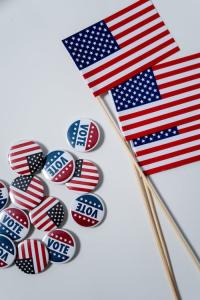A Year in Political Advertising Hell

The American public is about to enter “hell” for the next year. The political attack ads are coming. As much as ads for insurance and lawyers grate on my nerves, nothing is as awful as political advertising.
The suggestion that the doctrine of hell and political ads are from the same rhetorical genre may seem a bit extreme. I will make the case that is not so. Viewing political ads on television during a presidential campaign is like being in hell.
While I’m tempted to believe that “hell is political consultants,” that would be extreme. Besides, I really like James Carville. I am more likely to embrace a Flannery O’Connor approach to hell.
Reynolds Price: “Hell in O’Connor means being one of those people in Georgia who has to sit down and listen to your mother talk to you all day and all night, and you’re ugly and peg-legged and must hear your mother go on about Black people till doomsday.”
Political ads are constantly arresting the opponent and sending him or her off to political hell – losing the election.
Jerry Springer a full-time cultivator of this kind of rhetoric, of all people, made an astute observation about the impact of our political advertising:
“We have raised two generations of Americans who believe that anything the government does is horrible, all politicians are corrupt, ah . . . Washington is evil. And then every commercial we ever see, politically, on frankly on both sides of the aisle . . . is how the other guy is a bum, the other guy should be in jail, the other guy is a pervert, whatever. Well, if you raise two generations of kids to believe that about our own government . . . you can’t then be surprised that eventually someone would run for president who is absolutely anti-government. . .. So, we should have seen it coming that eventually someone would run for president who was an entertainer and totally against government. . .. And that’s what we are living with today.”
Lies
For example, Americans are of the opinion that all politicians lie. As voters, Americans have long accepted that politicians lie as part of the democratic bargain. Presumably, this is because candidates feel like they must pander to voters, and maybe even mislead voters in the process, in order to get elected. A New York Times article summed up the situation: “All Politicians Lie. Some Lie More Than Others.”
In a falsehood face-off Marjorie Taylor Greene is the lying-est liar in American politics. According to the fact-checkers at PolitiFact, when it comes to lying:
Rep. Marjorie T Green 85% (mostly false) 14% (“Pants on Fire” false)
Ben Carson 84%
Donald Trump 76%
Ted Cruz 66%
Senator Marco Rubio 40%
Jeb Bush 32%
President Joe Biden 32%
Chris Christie 32%
Senator Rand Paul 32%
Bernie Sanders 28%
Hillary Clinton 28%
Barack Obama 26%
Bill Clinton 24%
After all, lying is not prohibited in political advertising. Tom Wheeler, former chairman of the Federal Communications Commission under former President Barack Obama, speaking of political advertising says, “Unfortunately, you’re allowed to lie. The government stepping in and saying, this is good speech, this is bad speech is something that the government has tried to avoid.”
The FCC regulates profanity, and the Truth in Advertising Act regulates product advertising; political advertising has no such prohibitions. When it comes to political advertising, it’s the “Wild, wild West.” Take your best shot. Weaponize your words. General Maximus in Gladiator could give the command to political advertisers: “At my command, unleash hell!
The liars don’t have to identify themselves. Wheeler points out, “You know, a commercial for cornflakes says it’s Kellogg’s. The problem is that a political ad that is sponsored by Americans for puppies and the flag – you’ve got no idea who that is.”
Fear
Political ads are designed to create fear and the weeping and gnashing of teeth. The only other experience of life that can be compared to the horrors of political advertising is sitting in a small Southern Baptist church on a hot August Saturday night listening to the evangelist du jour railing about hell. From now until the 2024 election, Americans are going to feel as if they are attending a revival service where the preacher pours out hell, fire, and damnation every night for the entire year. For television consumers, this will feel like “Groundhog Day.”
Comparing political advertising to sermons on hell makes sense. Both have the same rhetorical goal: scare the hell out of people. The Baptist preacher conjuring the flames of hell before the eyes of his congregation has no restrictions. He is free to embellish, exaggerate, and exclaim the attributes of a literal hell with real flames and torments to his heart’s content and to his congregation’s discomfort.
In the short story, “Tongues of Fire,” the preacher, Mr. Looney cries, “Think about it, beloved. Do you want to burn in Hell forever, at the Devil’s barbecue? Or do you want to lie in banks of flowers, listening to that heavenly choir?”
Perhaps Lyndon Johnson’s campaign initiated attack ads with the “Daisy” ad aimed at frightening voters that Barry Goldwater would cause a nuclear war.

The Fault Is “Us”
Rather than blaming the creators of political ads, perhaps we need to look at the audience: American voters. A composite picture of the American voter would include our desire for simplicity and disdain for complexity, our love of opinions (the more divorced from facts the better), our frenetic pace of busyness and hurriedness, our distaste for subtilities, irony, contingencies, multiple options, our love of apocalyptic dualisms, our fear of higher education, and our disgust for anything that we feel threatens our personal freedom. We Americans have a deep and abiding resentment even for those celebrities, rich people, and politicians we claim to idolize. We love simplicity, spontaneity, and impulsivity. And we are increasingly transactional: “What’s in it for me?” “What can I get from this?” “What will this cost me?”
Yet survey after survey indicates that people claim to loathe political ads. After assessing the results of opinion polls which queried Americans about their responses to political ads, Gallup’s Deborah Jordan Brooks declared that “the American public has little tolerance for negative ads, or for political ads in general.” Perhaps the public understands at some level that negative political ads are wrong, and in surveys they don’t wish to suggest that they support such awfulness. Down deep, these ad reveal much about us as voters.
There are shared assumptions in political ads that mirror how the American public often feels. Roderick P. Hart argues that said advertising is “aggressively enthymematic,” relying on voters to draw on shared assumptions and participate in the construction of the ads’ arguments. Subconsciously the audience supplies the missing premises in the political ads.
If the ads reflect what voters desire, want, and are as citizens, then we should know that we have a problem.
The American voter keeps sliding into a more fixed idea of declining political trust in the United States (trust in leaders, trust in fellow voters). And political advertising greases the slippery slope. Our ads are not about our candidates, but about the kind of people we have become. The advertising teams that keep pouring out the attack ads have a cheerleading squad made up of millions of Americans enjoying the spectacle of negativity while insisting they hate it.
The political consultants, pretending to be our political experts, our psychologists proposing remedies for all that ails the nation, create a climate in which “pathology is drawn to pathology.” Political advertising, in its current devolved form, further weakens a democracy that is already reeling from mistrust, resentment, and anger. In short, the ads reinforce the diseases of our socioeconomic pathologies.
From the time Jonathan Edwards depicted his congregation hanging over the open flames of hell by the single strand of a spider’s web to our current decline in religious participation, there has been a falling away from preaching on hell. More and more Americans have resisted notions of a literal hell and the ability of evangelists to frighten people almost has disappeared. Whether or not there is a hell, there’s not much preaching about it anymore.
One can only hope that the same fate soon awaits the advertising evangelists gearing up to give us another year of “hell fire and damnation” television advertising filled with lies, misinformation, and characters attacks. May their demise be quick.













